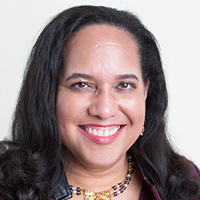
I have had women and people of color tell me that they feel like they were “talked at and not talked to” in previous experiences with other financial advisors. I know what this can feel like, as I’ve also experienced it in certain situations, as a woman of color. I do not think advisors do this intentionally; I think it is done subconsciously. But it’s more common than advisors may realize.
Numerous studies have shown how regularly women are talked over by their male peers. I believe the same dynamic happens when a person perceives themselves as an authority on a matter — for example, they think, “I have the securities licensing and experience, so I’m the qualified speaker here’.”
However, financial advisors who don’t challenge themselves to improve their communication skillset face some very real consequences that can negatively impact their businesses. This includes:
- Losing business. Women have a high rate of transferring advisors after their spouse passes — an often-cited figure is 70%.
- Breaking fiduciary duties. I have had women and people of color transfer their accounts over to me, and we’ve sometimes discovered through conversations that their previous financial advisors did not discuss investment recommendations with them, educate them on the different share classes, and talk about the difference between discretionary and non-discretionary accounts. They didn’t know their advisors should’ve been speaking with them about these things so they could’ve been involved in helping decide what was personally right for them.
- Leaving prospective clients at the door. According to a study cited in the Journal of Financial Planning, black households “are significantly more likely to use financial planners compared to all other racial/ethnic groups when controlling for other household characteristics.” Collectively, the buying power of the black and brown community is valued at more than $1 trillion, notes the CFP Board, and the latest census confirms this population as reaching majority of the US population by 2045. So, it would be prudent for a financial advisor with a practice poised for growth to address how best to be part of this growing demographic rather than leaving them at the door.
Learning to Shift Gears
I believe the crux of the problem isn’t financial advisors disregarding their fiduciary duties to properly disclose and explain, but rather advisors not learning how to shift gears to “talk to” a client. As a result, the client conversations have been stunted.
In this heightened time of SEC scrutiny on how financial advisors are operating in the best interest of the client, this is a skillset critical for advisors to develop and expand. How can financial advisors assert they were acting in the best interest of a client if they do not know what is most important to that client?
To discover this, one must have a dialogue, not a monologue. Our country’s physicians had to learn how to discuss options and educate the patient on their options – so too must we financial advisors.
In working with those who have been underserved by my financial services industry, I have found it key that one takes the time to learn clients’ priorities and perspectives. It is necessary to familiarize ourselves with the “operating manual” of our clients, because they should be the driver behind financial decisions being made.
Learning Different Perspectives
For instance, if a client is taking on financial obligations for friends or family who are close to them but who are not technically what our industry would classify as “dependent,” it is important to listen and learn their perspective.
Many women and people of color operate under the guiding principle of, ‘To whom much has been given, much is expected.” These clients often feel immense gratitude for the doors that have been opened for them and they know many others who did not have access to such opportunities.
Although a financial advisor might not personally agree with a client’s sense of duty or obligation to others, the advisor still has a duty to help that client find good options to address what compels the client and drives her financial decision-making. This puts the client on the path of finding financial solutions that resonate with them.
When I wanted to help a client who was a single mother with a financial goal of increasing her savings rate for investing, we reviewed her monthly outlay for her household. After discovering she was still paying the cellphone bills of her two emerging adult children who were transitioning from college into full-time employment, we discussed a plan that would give them a fair heads-up regarding becoming financially responsible for their own phone bills.
My client felt good about it because we made it a financial education conversation where she in turn had her children look at their own income and monthly outlay so they could be ready to assume the bill at a predetermined date.
Philanthropy Tendencies
I have noticed my clients, who are often the first in their family line to work with a financial advisor, feel an eagerness to share what they are learning with those close to them. Providing pathways to help them with financial literacy is one of the most cherished gifts an advisor can give.
As I assisted one very successful female client of color, who came from very humble beginnings, transition into retirement, I learned how much charitable giving filled her. She got more fulfillment out of this than any investment gains report I could lay before her. So I put my energy into finding tax-savvy ways that could help her efficiently donate to her long list of charities and ease her high income-tax burden.
My client was elated to see a long list of her favorite charities and the amounts she was sending them through distribution from her IRA. This was simultaneously addressing her required minimum distribution. She had already introduced me to her accountant, who was also elated that our mutual client’s RMD was coming out with no adverse income tax consequence. The client then enjoyed her investment earnings reports in the sense that they helped amplify her ability to give.
I have often chided her that she is the epitome of the “fishes and loaves” story because it seems like the more she gives, the more her IRA replenishes itself in value. Although she is one of my older clients, she has chosen to have me invest it in a risk style she would want for her young designated beneficiaries on the account. This higher allocation for growth-oriented investments, that traditionally is more appropriate for a young person, has produced returns that keep replacing what she has taken in distributions for her favorite charities.
It has been quite a lesson for me, as a financial advisor, to see how educational dialogues can really help clients discover their true financial personality and align the purpose of their accounts with their personal goals.
Serving the Underserved Takes Practice
We must acknowledge as an industry that we do not have enough knowledge and understanding of the underserved segments of our society. Here I’m, speaking specifically about women and people of color.
Just think about any pursuit: If it is an activity you have had little exposure, you are naturally not going to be adept right out of the gate — it will take practice.
As we gain deeper understanding of the unique constraints and challenges facing clients, it will aid us in coming up with appropriate solutions to assist them where they are and addressing what is top of mind for them.
If a client says, “Please listen to me when I tell you I want to make sure I am on a path to financial security,” I want to know more about what is driving their concern beyond what their risk profile score may be.
There are unfortunate stats of both people of color and women who enjoyed financial success at the heights of their career and still ended life in poverty. The title of Harold Pollack’s Washington Post article “Middle-age blacks have less in their 401(k)s than young whites,” from Feb. 20, 2015, lays it quite bare.
In addition, many women in Medicaid-run assisted living facilities today did not require government income assistance during their working lives. Yet, those needing paid long- term-care support and services in their later retirement years seems to be heavily skewed to women, people of color, and those with limited education, according to this 2019 brief from the U.S. Department of Health and Human Services. There is real opportunity for financial advisors to change the trajectory of such outcomes with compassionate dialogue.
The Big Picture
Our nation has reached an inflection point where we are finally facing the disparity numbers on so many levels. As financial advisors, we should be ready to help find solutions that are appropriate for clients, based on the unique challenges they face. Helping a client get on the right track can also enable them to become an adept source of talent that can help address our society’s inequities. We are a resource that can help solve this, and with robust discussion, in a way that no robo-advisor can.
Speaking to a client and not at them, we will learn to naturally modulate our explanations and recommendations to be appropriate for the client before us.
As one client often tells me when she feels enlightened about something she just learned with me, “Monique, you put it where the goats can get it!”
Her feedback reminds me that I must strive to make what I am trying to impart digestible and comprehensible. I believe better educated clients can make better decisions for themselves. Better financial decisions — isn’t that what we are striving for as an industry?
Monique Castillo, is a financial advisor and the founder of Higher Ground Financial Services, an independent Philadelphia-area firm that offers advisory services through Concourse Financial Group Advisors and securities through Concourse Financial Group Securities, Inc. (CFGS). Higher Ground Financial Services is independent of CFGS.







